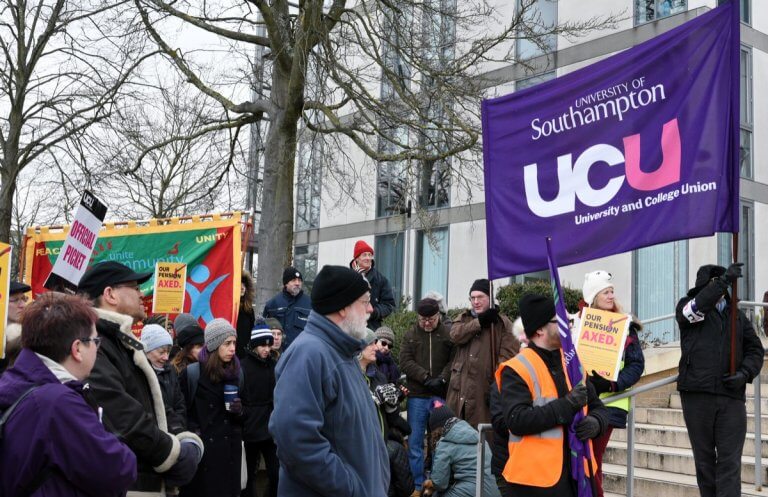
Two weeks ago, the University and College Union (UCU) announced a two-day strike, scheduled for the end of January across 16 UK colleges. Starting on January 29, lecturers and staff who are UCU members will stage a walk out. If there’s no resolution, members warn of further action. The full list of colleges taking part can be found here.
What should students do during these two days? The answer is clear: support the strike.
The situation is dire for the figures that matter most in education. Staff pay has fallen by 25 percent in real terms over the past decade and compared to school teachers – who had a pay rise last year – they earn around £7,000 less.
To date, college bosses have failed to make a decent offer to staff. Their request for a rise of five percent or a fixed increase of £1,500 for staff earning less than £30,000 per year in their 2018-19 pay claim was denied. The Association of Colleges’ final offer was for a one percent increase or £250 for staff earning less than £25,000 a year.
Strike dates announced at 16 English colleges in pay row https://t.co/aWludyzP5B #FEFightsBack #FairPay
— UCU (@ucu) January 15, 2019
Massive wage inequality across the UK’s education sector is painfully clear to all. While the pay gap between further education lecturers and school teachers is around £7,000, Vice-Chancellors are being “grossly overpaid”, with an average pay of £268,103 in salary, bonuses and benefits. Some, like Christina Slade of Bath Spa University earned an eye-watering £808,000, as revealed by Times Higher Education in December 2017, including a £429,000 pay-off for “loss of office”.
Head of Policy, Matt Waddup, said: “UCU members are being forced to take strike action to secure fair pay because they have had enough of watching their pay being eroded while their workloads increase.
“The government must take the blame for a failure to invest in further education, but colleges cannot hide behind these cuts to shirk responsibility for their staff. UCU will continue to campaign for more investment from the government but, whether this is forthcoming or not, strikes will continue until colleges show that they are at last prioritising their staff.”
UCU’s strikes are part of the ‘unprecedented’ tide of collective action by educators worldwide. From Los Angeles to Leicester, Greece to England, austerity is cutting funds to important social services – including education. The people most at risk, with their wages and livelihood affected, are its most important: teachers.
In the US last year, fifteen districts in Washington state started the school year on strike, demanding for salary increases legally owed to them from a Supreme Court decision. Since December, thousands of educators in Greece have been striking and demonstrating against a proposed government bill that could see thousands of substitute teachers fired and many others displaced to schools far away from their homes and families.
In the UK, this week’s strikes come as a follow-up from a rally last October where trade unions, students and colleges took to the streets of London to call for better funding and fair pay.
Staff in FE have not received a pay rise for an “unconscionably long time”, according to a report that compared international further education systems.
“… [the] government’s big cuts in further education funding greatly weaken colleges and leave them under-resourced,” it said.
“Staff have not received a pay rise for an unconscionably long time, and continued budget pressures are leading colleges to cut lecturing and support staff, leading to exploitative work intensification.”
The report also found colleges deskilling the profession by redesignating lectureships to casual teachers and assessors paid by the hour, also having their institutional roles neglected by governing boards.
For students, a teacher strike inevitably evokes the prospect of losing contact hours and disruptions to their timetable. But to blame staff and teachers for this would be a massive injustice.
Strikes are always a last resort, and a UCU spokesperson told Study International that students are aware of the motivations behind their actions.
“We hope they will see that it is the actions of college leaders that have led us to this point, and that they are the ones ultimately responsible for any disruption to students’ education.
“Many students recognise that staff’s working conditions are their learning conditions and if we improve the situation for staff that will have an impact on their learning, too. Colleges themselves admit that low pay is one of the main reasons they are struggling to recruit and retain the staff they need.”
It’s absolutely crucial that teachers win in this strike and they deserve our full backing. Instead of wrongly blaming the teachers for disrupting their learning, students should see the strike as an inspiring example of collective action to achieve social good. While it’s understandable for international students paying high fees to study in the UK to lament the loss of teaching hours, the strike, if successful, would ultimately benefit students, resulting in a more motivated teaching force and better learning conditions.
As such, students should go beyond just asking their teachers to learn more about the strike. They should find out how they can show their support as well. Education is our collective responsibility. All of us should do our part to support the teachers that make it possible.
* This is the personal opinion of the writer and does not reflect the views of Study International.
Liked this? Then you’ll love…
UK vice-chancellors lavish expenses revealed amid massive lecturer strikes
Pressure grows for UK schools to offer refunds as pensions strike continues







